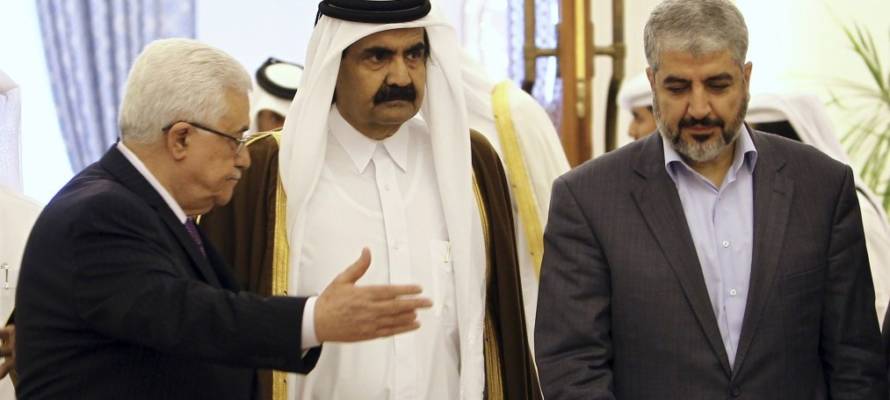Four Arab countries have cut diplomatic ties with Qatar – a development that could prove to be in Israel’s best interests.
Bahrain, Egypt, Saudi Arabia and the United Arab Emirates (UAE) cut diplomatic ties to Qatar early Monday morning, further deepening a rift among Gulf Arab nations over that country’s support for Islamist terror groups and its relations with Iran.
The four countries announced the withdrawal of their diplomatic staff from Qatar, a gas-rich nation that will host the 2022 FIFA World Cup and which is home to a major US military base. Qatari troops will be pulled from the ongoing war in Yemen, Saudi Arabia said.
They will also eject Qatari diplomats from their territories and plan to cut air and sea traffic. Saudi Arabia said it will shut its land border with Qatar, effectively cutting the country off from the rest of the Arabian Peninsula.
Etihad, the Abu Dhabi-based carrier, is suspending flights to Qatar “until further notice.” Emirates, the Dubai-based carrier, and budget carrier FlyDubai have followed suit.
Qatar’s Foreign Affairs Ministry said there was “no legitimate justification” for the countries’ decision, vowing that its citizens will not be affected by the “violation of its sovereignty.”
As noted by Seth Frantzman of The Jerusalem Post, there is reason to be optimistic that this development could benefit Israel, and he lists five reasons.
First, he notes, it hurts Hamas, the Gaza-based Islamic terror organization. “Qatar has supported Hamas over the last decade and hosted former Hamas leader Khaled Meshaal for the last five years in Doha. In 2012 Qatari Emir Sheikh Hamad bin Khalifa al-Thani visited Gaza and pledged hundreds of millions for the strip. Qatar therefore provided Hamas not only a home in Doha but financial support and diplomatic succor. The new pressure on Qatar has encouraged it to expel Hamas members and will reduce its support for the group.”
Regional Opposition to Qatar’s Embrace of Terror Groups
Second, the article continues, “so long as Egypt, Jordan, Saudi Arabia and other states work in concert [against Islamic terror], the winds of stability will blow in Israel’s direction as well.”
Saudi Arabia said it took the decision to cut diplomatic ties due to Qatar’s “embrace of various terrorist and sectarian groups aimed at destabilizing the region” including the Muslim Brotherhood, al-Qaeda, the Islamic State (ISIS) group and groups supported by Iran in the kingdom’s restive eastern province.
Egypt’s Foreign Ministry accused Qatar of taking an “antagonist approach” toward Egypt and said “all attempts to stop it from supporting terrorist groups failed.”
The tiny island nation of Bahrain blamed Qatar’s “media incitement, support for armed terrorist activities and funding linked to Iranian groups to carry out sabotage and spreading chaos in Bahrain” for its decision.
Qatar has continually faced criticism from its Arab neighbors over its support for Islamists. The chief concern is the Muslim Brotherhood, a Sunni Islamist political group outlawed by both Saudi Arabia and the UAE as it challenges the nations’ hereditary rule.
Gulf countries led by Saudi Arabia fell out with Qatar over its backing of then-Egyptian President Mohammed Morsi, a Brotherhood member. In March 2014, Saudi Arabia, the United Arab Emirates and Bahrain recalled their ambassadors from Qatar over the rift. Eight months later, they returned their ambassadors as Qatar forced some Brotherhood members to leave the country and quieted others. However, the 2014 crisis did not see a land and sea blockade as threatened now.
Since then, Qatar repeatedly and strongly denied it funds terror groups. However, it remains a key financial patron of the Hamas-controlled Gaza Strip and has been the home of exiled Hamas official Khaled Mashaal since 2012.
Western officials have also accused Qatar of allowing or even encouraging funding of Sunni terrorist groups such as al-Qaeda’s branch in Syria, once known as the Nusra Front.
Common Threat of a Nuclear Iran
Third, the Post points out, the break with Qatar encourages Israel’s already warming relations with Saudi Arabia and the Gulf states, which face the common threat of a nuclear Iran.
Even before Monday, Qatar appeared unperturbed by the growing tensions. On May 27, the country’s ruling emir, Tamim bin Hamad Al Thani, called Iranian President Hasan Rouhani to congratulate him on his re-election.
The call was a clear public rebuttal of Saudi Arabia’s efforts to force Qatar to comply with its policies against the Shiite-ruled nation, which the Sunni kingdom sees as its arch-enemy and a threat to regional stability. Qatar shares a massive offshore gas field with the Islamic Republic.
Qatar is also home to the sprawling al-Udeid Air Base, which accommodates the US military’s Central Command and some 10,000 American troops. It wasn’t clear if these recent developments will affect American military operations. Central Command officials and the Pentagon did not immediately respond to a request for comment.
Taking Attention Away from the Israeli-Palestinian Conflict
Fourth, Frantzman says, contrary to the Obama era, when Israel was increasingly isolated, US President Donald Trump’s resolve to defeat Islamic terrorism includes an appreciation of the Jewish state as a dependable ally.
Last, it takes world attention away from the Israeli-Palestinian conflict ” If the Arab states are more concerned with Iran and Qatar than with the Palestinians, that takes pressure off of Israel… “Over the years, Israel has gone from being seen as the center of the region’s problems.” Today, however, “the Palestinian issue is dwarfed by larger conflicts in Syria, Iraq, Yemen Libya and now in the Gulf.”
By: United with Israel Staff
AP contributed to this report.
Do You Love Israel? Make a Donation - Show Your Support!
Donate to vital charities that help protect Israeli citizens and inspire millions around the world to support Israel too!
Now more than ever, Israel needs your help to fight and win the war -- including on the battlefield of public opinion.
Antisemitism, anti-Israel bias and boycotts are out of control. Israel's enemies are inciting terror and violence against innocent Israelis and Jews around the world. Help us fight back!























